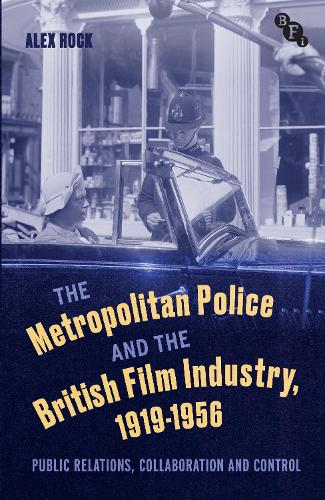
The Metropolitan Police and the British Film Industry, 1919-1956: Public Relations, Collaboration and Control
(Paperback)
Available Formats
Publishing Details
The Metropolitan Police and the British Film Industry, 1919-1956: Public Relations, Collaboration and Control
By (Author) Alex Rock
Bloomsbury Publishing PLC
BFI Publishing
23rd January 2025
United Kingdom
Classifications
Tertiary Education
Non Fiction
Police law and police procedures
Social and cultural history
791.4309410904
Physical Properties
Paperback
256
Width 138mm, Height 212mm, Spine 18mm
360g
Description
This groundbreaking book investigates the murky relationship between the Metropolitan Police Press Bureau and the British film industry, shedding new light on police-media relations. Beginning with the culture of suppression during the interwar period, when retired police inspectors were threatened with loss of pension should they become involved with the film industry, the relationship shifted when a forgotten pioneer of public relations, Percy Fearnley, was appointed to the role of Metropolitan Police Public Information Officer in 1945. Fearnley was the first-ever journalist to take up this role and, through him, the Metropolitan Police embarked on a series of collaborations with the highest echelons of postwar British cinema, including J. Arthur Rank, Ealing Studios and Gainsborough Studios. Using newly-declassified internal Metropolitan Police and Home Office correspondence, Alexander Charles Rock tells the story of the Metropolitan Polices project to manipulate the British film industry into producing propaganda under the guise of mainstream entertainment cinema. In doing so he offers a radical re-reading of the context of production of a number of canonical British films such as The Blue Lamp (1950), I Believe In You (1952) and Street Corner (1953).
Reviews
Rock has produced a critical reading of the public relations activity of the Metropolitan Police and their film industry collaborations in the twentieth century, foreshadowing issues around press-police relations identified in the Leveson inquiry. His forensic archival work identifies the impact of the first journalist and non-policeman, Percy Fearnley, appointed as the Mets Public Information Officer in 1945 and the contradictory tensions between committing to transparency and controlling the message. The book makes a strong contribution in developing a nuanced historical narrative that highlights the role of public relations in producing both propaganda and entertainment. -- Kate Fitch, School of Media Film & Journalism, Monash University, Australia
Author Bio
Alexander Charles Rock is Director of Commercial and Operations at Derby Museums, UK. He has published on the history of independent cinema, policing Londons cinemas during World War I and local film censorship. His writing has featured in Post Script and Early Popular Visual Culture.
